Toshiba products play an active role, be it in computing, controlling, powering, or communicating — transporting, cooking, playing, or even elevating. The company’s portfolio includes personal and professional computers (notebook PCs, servers), telecommunications and medical equipment (mobile phones, X-ray machines), industrial machinery (power plant reactors, elevators), consumer appliances (microwaves, DVD players), electronic components (electron tubes, batteries), and semiconductors. Its portfolio also includes air traffic control and railway transportation systems.
Contents
Criticisms
- Toshiba is among those companies who have chosen to remain financially involved in Burma despite the potential of any business to directly or indirectly strengthen the illegal military junta there. Source: Burma Forum Los Angeles
Featured Link: What’s wrong with doing business in Burma?
Toshiba Corp. has been Criticized for Health and Safety issues:
- In February 2004, the U.S. Occupational Safety and Health Administration (OSHA) proposed a $ 162,450 fine against Toshiba International Corp. in Houston for exposing workers to hazards after the electrocution of an employee in the summer of 2003. Citing Toshiba with eleven violations after an inspection that began Aug. 23, when an employee died after contact with a 4,160-volt feeder in a substation, OSHA alleged Toshiba failed to adequately train employees on the dangers of electrical hazards and on safety procedures during maintenance work. Among the eleven violations cited were nine “serious violations,” or violations in which an employer knew or should have known could likely result in death or serious injury.
- In October 2003, a Toshiba Medical Systems container filled with liquid helium burst, seriously injuring eight people at Matsumura General Hospital, Japan.
- In July 2003, Toshiba recalled 3,400 rear projection televisions (model Nos. 50A62, 51H83 and 57H83) because the capacitors were faultily made and posed an electrocution hazard. Source: United Press International, July 3, 2003, et al.
- In October 2003, Toshiba Corp. attempted to introduce “a new, unconventional electricity-generating plant powered by a small nuclear reactor,” to Galena, a Yukon River village in Alaska. As a response to growing problems over diesel, power, officials in the region had sought out alternate forms of technology. Nuclear watchdog and environmental groups, however, advised officials to use caution, citing the nuclear power industry’s “history of making bold claims it couldn’t back up.” Source: Associated Press, Oct. 21, 2003
- Toshiba operates maquiladoras, foreign-owned assembly plants in Mexico where companies import machinery and materials duty-free. Source: Corporate Watch
Featured Link: What’s Wrong with Maquiladoras?
Praise
- In October 2003, the Environmental Working Group published a study that exposed the presence of PBDEs, chemicals used in flame retardants, in women’s breast milk in the United States and abroad. Their emerging data suggested that the PBDEs pollute the environment and may have subtle toxic effects on humans, despite having passed standard safety tests. Toshiba, along with Fujitsu, and NEC Corp., have announced a phaseout of PBDEs from their products. Source: Environmental Working Group, Oct. 25, 2003
- Toshiba contributed to a $165,000 package given to communities in Aceh in Indonesia to help with tsunami relief and reconstruction efforts. Source: Ethical Corporation
- The Computer TakeBack Campaign gave Toshiba a “needs improvement” grade on its 2002 Report Card, which grades 28 computer manufacturers on the environmental impacts of their production and disposal of computer equipment. The company was praised for its efforts to reduce the use of lead in production but was criticized for its “take-back” policies in the US. Source: Computer TakeBack Campaign






